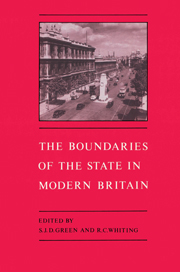Book contents
- Frontmatter
- Contents
- List of figures
- List of tables
- List of contributors
- Acknowledgements
- 1 Introduction: the shifting boundaries of the state in modern Britain
- Part I The state and political theory
- Part II The economy
- Part III Welfare and social policy
- Part IV Conflict and order
- Part V Religion and morality
- 14 Survival and autonomy: on the strange fortunes and peculiar legacy of ecclesiastical establishment in the modern British state, c. 1920 to the present day
- 15 Religion and the secular state
- 16 The British state and the power of life and death
- 17 Conclusion: on the past development and future prospects of the state in modern Britain
- Index
14 - Survival and autonomy: on the strange fortunes and peculiar legacy of ecclesiastical establishment in the modern British state, c. 1920 to the present day
Published online by Cambridge University Press: 18 March 2010
- Frontmatter
- Contents
- List of figures
- List of tables
- List of contributors
- Acknowledgements
- 1 Introduction: the shifting boundaries of the state in modern Britain
- Part I The state and political theory
- Part II The economy
- Part III Welfare and social policy
- Part IV Conflict and order
- Part V Religion and morality
- 14 Survival and autonomy: on the strange fortunes and peculiar legacy of ecclesiastical establishment in the modern British state, c. 1920 to the present day
- 15 Religion and the secular state
- 16 The British state and the power of life and death
- 17 Conclusion: on the past development and future prospects of the state in modern Britain
- Index
Summary
The progressive, and seemingly inexorable, decline of the Church of England – as political body, social institution and moral medium – is no more than a commonplace of contemporary British cultural criticism. Scarcely less obvious is the increasing, and apparently irreversible, process of separation between Church and state in the formal arrangements of the British constitutional regime. So much indeed have decline and separation, whether strictly defined or informally assumed, become part of what might be called the educated orthodoxy in modern British intellectual life that even the most cursory consideration of the remaining ecclesiastical dimensions, or – more daring still – of the shifting religious boundaries of the later twentieth-century British state, might almost be construed as precious, even as eccentric. For organisational decline, whatever else it means, has always implied decreased significance. And political separation appears only to have been wrought at the price of diminished protection. As a result, the aura of a body of a marginal, even of exiguous, importance is today unmistakable. This appears at once an invitation to pass on to more pressing concerns, and an injunction to pass over the afflicted in polite silence.
Yet in what follows, neither of these ostensibly rigorous and respectful imperatives will be obeyed. In part, this is as a protest against any conception of the modern state, British or other, which would view it as no more than the sum of its transfer payments; still worse as the mere product of its macro-economic management. For states, whether they like it or not, embody profound principles about how their citizens properly should live.
- Type
- Chapter
- Information
- The Boundaries of the State in Modern Britain , pp. 299 - 324Publisher: Cambridge University PressPrint publication year: 1996



